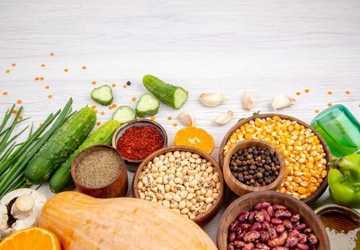Inflammation, the body's innate reaction to injury and infection, can occasionally escalate, resulting in persistent health issues like arthritis, heart disease, and even cancer. Fortunately, there are ways to combat inflammation naturally, and one of the most effective methods is through your diet. Adding anti-inflammatory foods to your daily meals can assist your body in combatting inflammation and lowering the risk of chronic disease development.
Anti-Inflammatory Foods to Incorporate Into Your Diet
Inflammation is a double-edged sword, a natural defense mechanism that can sometimes become a chronic and silent threat to our health. While our bodies rely on inflammation to fend off infections and heal wounds, excessive or prolonged inflammation can lead to chronic diseases, from arthritis to heart conditions. One positive aspect is that our diet offers one of the most effective means to address this inflammation.
Embracing anti-inflammatory foods in our daily diet allows us to tap into the natural power of these foods, promoting overall well-being and diminishing the risk of various health concerns. This article explores the top ten foods known for their anti-inflammatory properties that you should wholeheartedly embrace in your dietary choices.

1. Fatty Fish
Fatty fish, including salmon, mackerel, and sardines, are known for their high content of omega-3 fatty acids, which are famous for their strong anti-inflammatory attributes. These fatty acids help reduce inflammation by inhibiting the production of pro-inflammatory substances.
Furthermore, they support heart health and can alleviate symptoms of autoimmune conditions like rheumatoid arthritis.
2. Berries
Fruits such as blueberries, strawberries, and raspberries are rich in antioxidants, especially anthocyanins, which have demonstrated the ability to reduce inflammation and oxidative stress. Adding a diverse selection of berries to your diet can offer a wide range of nutrients that aid in alleviating inflammation and enhancing your overall well-being.
3. Leafy Greens
Leafy greens like spinach, kale, and Swiss chard boast an abundance of vitamins, minerals, and antioxidants known for their anti-inflammatory properties. These greens are particularly rich in vitamin K, which is crucial in regulating inflammation and protecting against chronic diseases.
4. Turmeric
Turmeric is a golden-hued spice used for centuries in traditional medicine for its potent anti-inflammatory effects. Curcumin, the active component present in turmeric, holds the potential to suppress inflammation and is believed to be as powerful as some anti-inflammatory drugs without the accompanying side effects. By incorporating turmeric, you can enhance both the flavor and health benefits of your soups, stews, and curries.
5. Nuts and Seeds
Almonds, walnuts, and flaxseeds are fantastic providers of healthy fats, fiber, and antioxidants. These nutrients help reduce inflammation and can lower the risk of chronic diseases. Nuts and seeds are convenient snacks or toppings for salads and yogurt, making them easy to incorporate into your daily diet.
6. Olive Oil
Olive oil, an essential component of the Mediterranean diet, is celebrated for its remarkable anti-inflammatory characteristics. It contains oleocanthal, a natural compound that functions similarly to non-steroidal anti-inflammatory drugs (NSAIDs). Using extra virgin olive oil as your primary cooking oil or drizzling it over salads can provide you with this health-promoting compound.

7. Ginger
Ginger, a potent rhizome frequently employed as a seasoning and a herbal treatment, boasts robust anti-inflammatory properties. Gingerol, its active compound, can potentially alleviate osteoarthritis symptoms, muscle discomfort, and soreness.
You can reap these benefits if you incorporate freshly grated ginger into your culinary creations or savor it as a comforting mug of ginger-infused tea.
8. Green Tea
Green tea is renowned for its multitude of health advantages and anti-inflammatory characteristics. It is rich in antioxidants, particularly epigallocatechin-3-gallate (EGCG), which has been studied for its potential in reducing inflammation and protecting against chronic diseases. Replacing sugary drinks with green tea can be a simple yet effective way to boost your anti-inflammatory intake.
9. Tomatoes
Tomatoes, a flexible fruit-vegetable rich in lycopene, a potent antioxidant renowned for its anti-inflammatory attributes, aid in mitigating inflammation in both the lungs and the entire body. Whether you incorporate them fresh into your salads, use them as a foundation for sauces, or savor them in a delightful gazpacho, tomatoes can make a wonderful dietary enhancement.
10. Dark Chocolate
Indeed, you've got it. Dark chocolate boasting a cocoa content of 70% or more is a remarkably tasty anti-inflammatory dietary option. It contains flavonoids that may reduce inflammation and improve heart health. However, moderation is key here; savor small amounts of dark chocolate as an occasional treat to enjoy the benefits without overloading on suga
Incorporating these anti-inflammatory foods into your diet can be a transformative step toward better health and well-being. While these foods can help reduce inflammation, it's also crucial to maintain a balanced diet and practice portion control for overall health. Here are a few tips to help you get started:
Diversify Your Plate: Aim to incorporate various anti-inflammatory foods into your meals. A colorful plate often signifies a nutrient-rich one.
Limit Processed Foods: Highly processed foods, like sugary snacks and fast food, often contain pro-inflammatory ingredients. Reducing your intake of these items can significantly affect inflammation levels.
Cook at Home: Cooking your own meals offers greater command over the ingredients and cooking techniques, simplifying the incorporation of anti-inflammatory foods.
Stay Hydrated: Water is essential for overall health and can help flush out toxins. Adequate hydration is an important part of managing inflammation.
Monitor Portion Sizes: Excessive consumption of even nutritious foods can lead to inflammation. It's important to be conscious of portion sizes and attuned to your body's hunger signals.
Consult a Healthcare Professional: For individuals with particular health issues or ongoing conditions, seeking guidance from a healthcare expert or a registered dietitian is recommended to develop a tailored anti-inflammatory dietary plan.
Conclusion
What you eat plays a significant role in your body's inflammatory response. Incorporating these top 10 anti-inflammatory foods into your daily diet can promote overall health and reduce the risk of chronic diseases. Remember that making long-lasting dietary changes takes time and consistency. So, start by including some of these foods in your next meal and let them be the first step in your journey towards a healthier, less inflammatory life.















